Given the track record of U.S. authoritarianism, Nat Parry says it’s not surprising that Democrats’ calls for resisting the incoming Trump dictatorship ring hollow for many Americans.
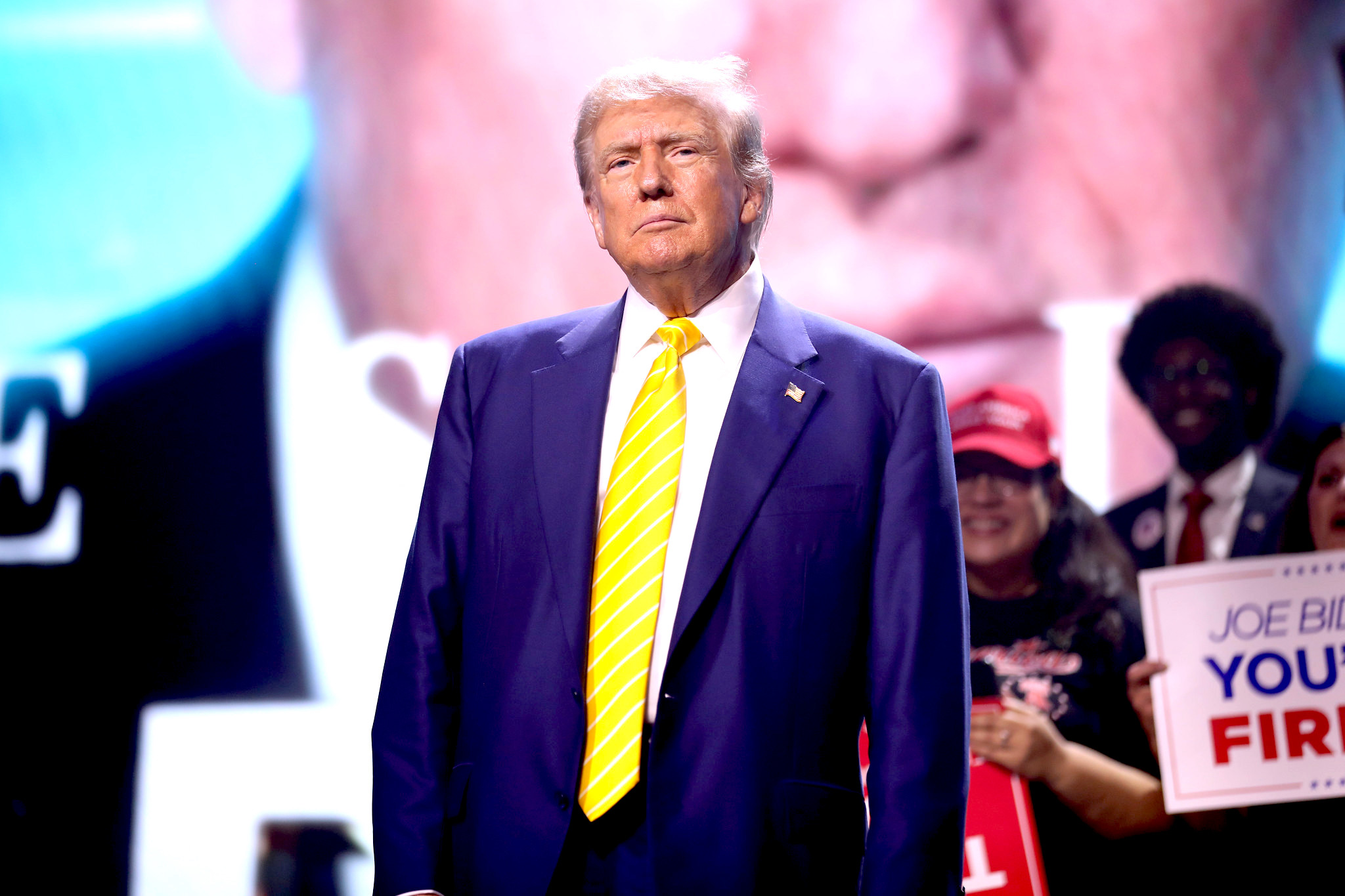
Former U.S. President Donald Trump at a rally in Phoenix on June 6. (Gage Skidmore, Flickr, CC BY-SA 2.0)
By Nat Parry
Special to Consortium News
 With President Joe Biden’s poll numbers tanking, American liberals are doubling down on what they apparently consider the best hope for his re-election: a strategy that relies heavily on whipping up fears of a dictatorship led by Donald Trump — warning that he would not only trample constitutional rights but likely imprison his political opponents.
With President Joe Biden’s poll numbers tanking, American liberals are doubling down on what they apparently consider the best hope for his re-election: a strategy that relies heavily on whipping up fears of a dictatorship led by Donald Trump — warning that he would not only trample constitutional rights but likely imprison his political opponents.
Rep. Alexandria Ocasio-Cortez (D-NY) recently raised this specter on a podcast called “On with Kara Swisher,” openly fretting that President Trump would throw her in jail if he wins the November election.
“I mean, it sounds nuts,” she said, “but I wouldn’t be surprised if this guy threw me in jail.” The self-described democratic socialist added that “he’s out of his mind,” pointing out that in 2016, his campaign was marked by frequent calls to “lock her up,” in reference to his Democratic opponent Hillary Clinton. “This is his motto,” Ocasio-Cortez said.
MSNBC primetime host Rachel Maddow took these concerns a step further, stating that she is worried about Trump using camps to detain his political enemies, not unlike the early versions of concentration camps that Adolf Hitler used in Nazi Germany.
Maddow claimed that Trump “is openly avowing that he plans to build camps to hold millions of people,” pointing out that the camps could be used for both illegal immigrants and high-profile political opponents.
Trump has indeed talked alarmingly about camps for illegal immigrants without due process, vowing that he intends to take aggressive action to carry out mass deportations should he be elected.
He has also at times issued threats to political enemies — particularly those who have pursued legal action against him — hinting that they should expect retribution in a second Trump presidency. He warned on Truth Social, for example, that “IF YOU GO AFTER ME, I’M COMING AFTER YOU!”
That he would put not just undocumented migrants into camps but political opponents too is, at the moment, just speculation. Trump has not indicated any intention to engage in large-scale political repression, and it’s doubtful that the U.S. political framework — with its vaunted, even if imperfect, system of checks and balances — would allow such a thing to occur.
To be sure, Trump has some disturbing policies. But many of them, especially his aggressive foreign policy, are in accord with the Democrats, who praised him as “presidential” when he bombed Syria in 2018.
So while these dire warnings of a Trump dictatorship complete with concentration camps may strike some people as over-the-top and somewhat paranoid, they have taken on the air of conventional wisdom in Washington, following nearly a decade of hand wringing over the alleged Trump threat.
As Trump entered the political arena eight years ago, pundits were already raising the alarm about the authoritarian menace he supposedly posed.
Many of these warnings try to emphasize that America has never before faced such a threat and that a concerted effort was needed to counter it, that somehow Trump is an unique evil.
In an article in March 2016 entitled “Donald Trump Poses an Unprecedented Threat to American Democracy,” columnist Jonathan Chait dug up an old interview that Trump gave to Playboy magazine in which he seemed to express admiration for the Chinese Communist Party’s repression of pro-democracy demonstrators at Tiananmen Square in June 1989.
“Many of these warnings emphasized that America had never before faced such a threat and that a concerted effort was needed to counter it.”
Disregarding Trump’s qualifying words that the Chinese response to the Tiananmen demonstrations was “vicious” and “horrible,” Chait cited his statement as “evidence of an authentic and long-standing ideology,” one that is “infecting healthy elements of the body politic.”
But although Chait was primarily concerned about Trumpism itself, he also fretted that overreacting to the perceived threat could provide fuel to the descent into authoritarianism. “The perception that Trump poses a threat to democracy legitimizes undemocratic responses — if you believe you are faced with the rise of an American Mussolini, why let liberal norms hold you back?” Chait asked.
More colloquially, if you fight fire with fire, you can still get burned.
Instead of resorting to violence to stop the Trump threat, Chait insisted that he “can and must be defeated through democratic means.”
Any Means Necessary
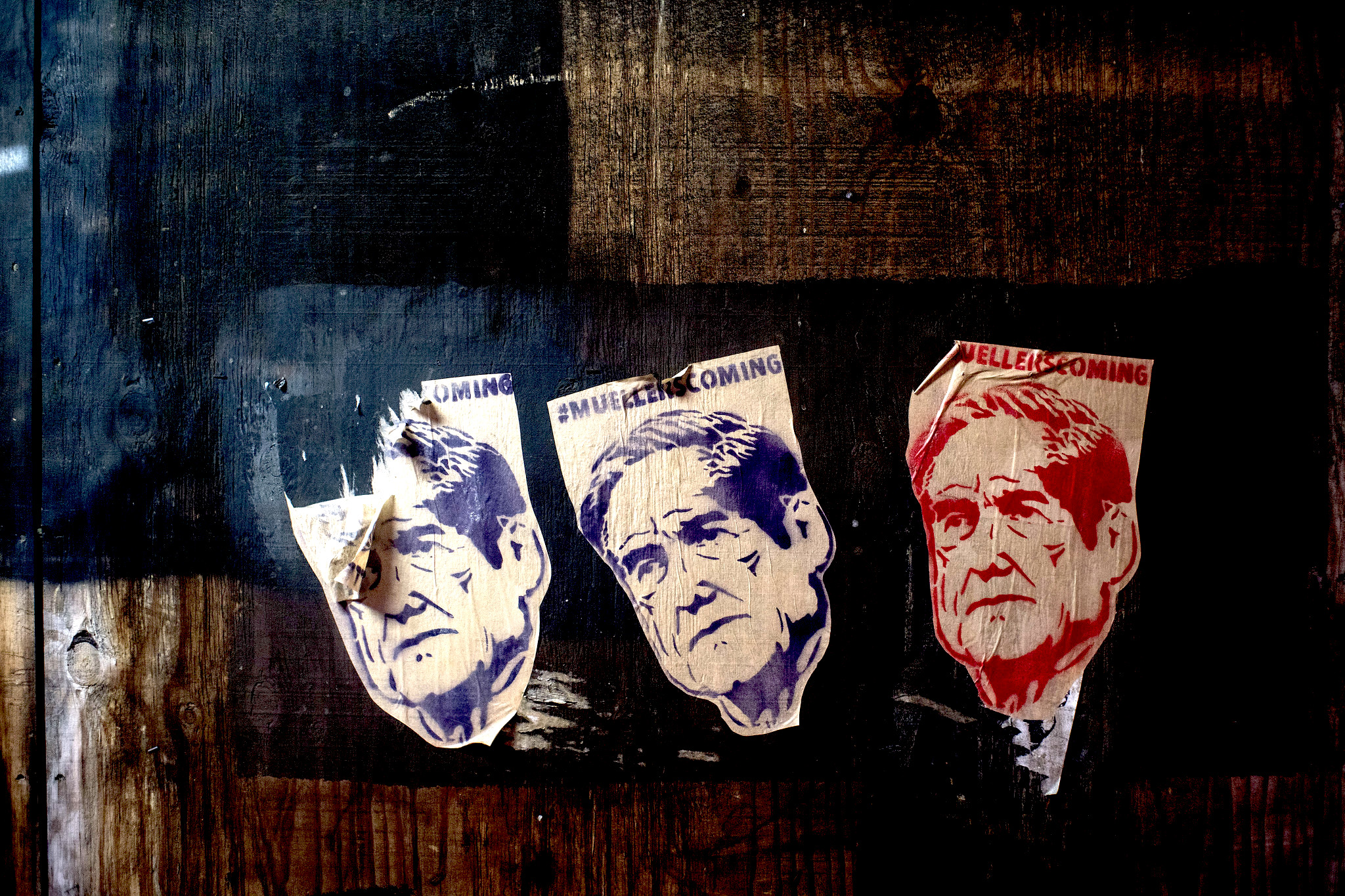
Street art in Washington, D.C., by Craig Tinsky. (Mike Maguire, Flickr, CC BY 2.0)
Events in subsequent years revealed that Chait’s concerns were more prescient than he might have imagined. It would become clear, indeed, that the priority of defeating Trump would embrace, to paraphrase Malcolm X, any means necessary.
It would also fall into a long line of similar periods in U.S. history in which the bipartisan state, in the name of preserving “liberty” and “American values,” veered out of control, repressing speech and demanding “loyalty.”
In Trump’s case, the political establishment employed a wide array of tactics to delegitimize his presidency, including a three-year investigation into alleged collusion with Russian President Vladimir Putin to influence the 2016 election — an investigation that conceded in March 2019 that it could not “establish that the [Trump] Campaign coordinated or conspired with the Russian government” — and an impeachment launched over a tactless phone call placed to the newly elected president of Ukraine in 2019.
In addition to these official proceedings, the liberal response to the Trump threat was marred by crackdowns on independent media, often portrayed as efforts to counter disinformation and “fake news.” The demonization of alternative media began in earnest with the blacklisting of some 200 outlets by the shadowy PropOrNot outfit and intensified with Hillary Clinton’s complaints that an “epidemic of malicious fake news and false propaganda” had cost her the election.
Please Donate to the
Spring Fund Drive!
Under increasing pressure, websites were throttled by search engines and shadow-banned by the algorithms of social media companies, culminating in a massive purge of alternative media just before the 2018 midterms, when some 800 anti-establishment accounts and pages were removed from Facebook.
Twitter also engaged in widespread censorship. As was later revealed by reporting of the “Twitter Files,” government agencies such as the F.B.I. exercised direct influence over content moderation at the popular social media platform.
In addition, Democratic partisans engaged in concerted efforts to attack anyone deemed responsible for helping Trump get elected, especially WikiLeaks for revealing Democratic Party corruption in the 2016 campaign, as well as Green Party supporters and others who had refused to vote for Democratic nominee Hillary Clinton, often portraying them as disloyal and traitorous.

Televised debate between candidates Trump and Clinton on Oct. 9, 2016. (GPA Photo Archive, Flickr, CC BY 2.0)
High levels of political violence also characterized the Trump presidency, with both right-wing groups such as the Proud Boys and left-wing movements such antifa and Black Lives Matter engaging in riots and assaults on those considered to be political enemies.
The intensity of the anti-Trump “resistance” was spurred by the perception that the threat posed by MAGA was unique. If allowed to develop unchecked, many Democrats wholeheartedly believed, it would surely mean the end of American democracy.
“The intensity of the anti-Trump ‘resistance’ was spurred by the perception that the threat posed by MAGA was unique.”
As Chait had warned, however, sometimes the responses to perceived threats can be more damaging than the threats themselves. The truth of this was revealed as the cumulative effect of the response to Trump became clear.
While it is debatable whether Trump and his MAGA supporters were ever truly the existential threats to democracy that his detractors claim, some of the responses to this alleged threat have clearly gone too far. The United States Supreme Court has pushed back on some of these efforts, for example, by reversing Colorado’s attempt to remove Trump from the ballot in the state.
With Trump positioning himself — once again — as the billionaire underdog standing up for traditional American values, his supporters tend to view the attacks on him as the sinister machinations of the “deep state,” rather than legitimate efforts to uphold the rule of law.
Even Trump’s recent felony conviction in the Stormy Daniels “hush money” case has had a negligible effect on his popularity, with most Americans — including 81 percent of Republicans — viewing the case as politically motivated.
Typical of US History

U.S. President Woodrow Wilson returning to New York harbor from the Versailles Peace Conference on USS George Washington, July 8, 1919. (Wikimedia Commons, Public domain)
What should also be appreciated is that even if MAGA Republicans are the unrepentant fascists that their detractors claim, the idea that this challenge is something utterly unique — a threat that requires an unprecedented response — is dubious. A cursory examination of American history reveals that from being unprecedented, in fact, anxiety over losing democracy is a defining characteristic of American politics.
Important lessons, in this respect, could be learned from earlier experiences, in particular how concerns over tyranny can at times lead to authoritarian excesses — in effect creating the very conditions that are purportedly being guarded against.
In the early 20th century, many feared that ideologies such as anarchism and socialism threatened to undermine the American way of life. Especially after the 1917 Bolshevik Revolution in Russia and a wave of bombings targeting politicians and industrialists in the United States, the U.S. government began viewing anti-capitalist movements as an existential threat to American liberty and launched an all-out crackdown on suspected subversives and radicals, in a campaign that came to be known as the Red Scare.
“In the early 20th century, many feared that ideologies such as anarchism and socialism threatened to undermine the American way of life.”
Initially seen as a reasonable and legitimate response to a domestic threat, excesses soon became apparent with American citizens persecuted, arrested, imprisoned, deported and sometimes executed often for little more than subscribing to a set of beliefs at odds with the dominant American paradigm and the policies of the U.S. government.
During World War I, Democrat Woodrow Wilson’s Espionage Act and his short-lived Sedition Act criminalized core First Amendment-protected activities, imposing harsh penalties for a wide range of speech that was seen as undermining U.S. war efforts.
American authorities then initially took a more accommodating approach to the rise of Nazism and fascism, gradually coming to see it as a threat that tested American democratic principles. In the 1930s, fascist sympathizers in the U.S. held huge rallies and championed their own leaders such as Virgil Effinger who led the Black Legion paramilitary organization which sought to establish fascism in the United States through revolution.
Americans of German descent established the Amerikadeutscher Volksbund, or German American Bund, in 1936. Operating nearly two dozen youth and training camps among 70 regional divisions around the country, the Bund boasted membership in the tens of thousands.

German American Bund parade on East 86th St., New York City, Oct. 30, 1937. (New York World-Telegram and the Sun staff photographer, Library of Congress, Wikimedia Commons, Public domain)
A rally it held in New York’s Madison Square Garden on Feb. 20, 1939, attracted 20,000 members and supporters who denounced alleged Jewish conspiracies and Democratic President Franklin Delano Roosevelt. The rally was protested by thousands of anti-Nazis, held back by 1,500 New York City police officers.
In response to the growing threat from within, Congress passed the Alien Registration Act in 1940, which required all resident aliens to register with the Immigration and Naturalization Service. Of the nearly 5 million registrants, about 600,000 were Italian nationals, 260,000 were German nationals, and 40,000 were Japanese nationals.
Convinced the Germans in particular were dangerous, Roosevelt urged the Justice Department to intern them all, but Attorney General Francis Biddle balked, hoping to avoid the appearance of “mass internment.” Following the attack on Pearl Harbor, however, these concerns were largely cast aside.
On the evening of Dec. 7, 1941, resident aliens considered most dangerous were immediately taken into custody, and over the next several months, more than 5,000 Japanese nationals, 3,250 German nationals and 650 Italian nationals were detained as enemy aliens.
Furthermore, on Feb. 19, 1942, Roosevelt issued Executive Order 9066, authorizing the forced removal of all persons deemed a threat to national security from the West Coast to relocation centers. Two-thirds of the 125,000 people displaced were U.S. citizens of Japanese descent. As many citizens were thrown into concentration camps, this was far more unconstitutional than Trump’s plans for undocumented immigrants.
Resident aliens who were not taken into custody were subject to curfews and restrictions on their freedom of movement, and were forbidden to possess radios, cameras, and weapons.
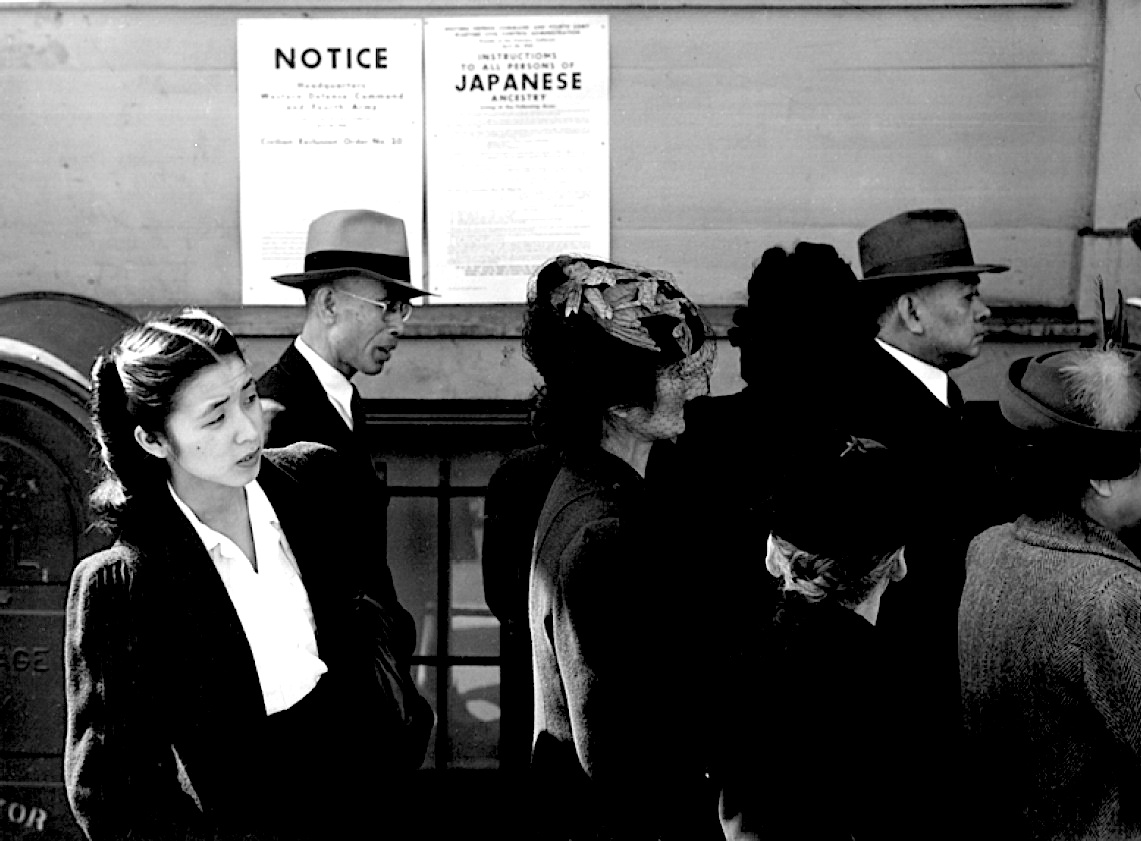
Japanese Americans in front of posters with internment orders, April 25, 1942. (Dorothea Lange, Wikimedia Commons, Public domain)
Literary Warnings
In this context, many fretted about threats to liberty from both internal subversives and the government. The ACLU’s then national executive director, Roger Baldwin, wrote in an open letter to President Roosevelt that his “unprecedented order is open to grave question on the constitutional grounds of depriving American citizens of their liberty and use of their property without due process of law.”
Baldwin argued that “the protection of our country” can be achieved without “a wholesale invasion of civil rights and without creating a precedent so opposed to democratic principle.”
The anxiety about the rise of authoritarianism and tyranny was also reflected in popular literature and film of the era, providing no shortage of evidence that concerns over democracies devolving into dictatorships have been deep-seated and widespread throughout modern American history.
Sinclair Lewis’ novel It Can’t Happen Here, a sardonic look at whether a Nazi-style dictatorship is possible in the United States, was published in 1935, kicking off a theme in popular culture of the totalitarian threat at home by outlining a detailed and convincing scenario for homegrown fascism taking root in America. Americans were fascinated by his dystopian vision, sending the book to the top of the charts with more than 320,000 sales.
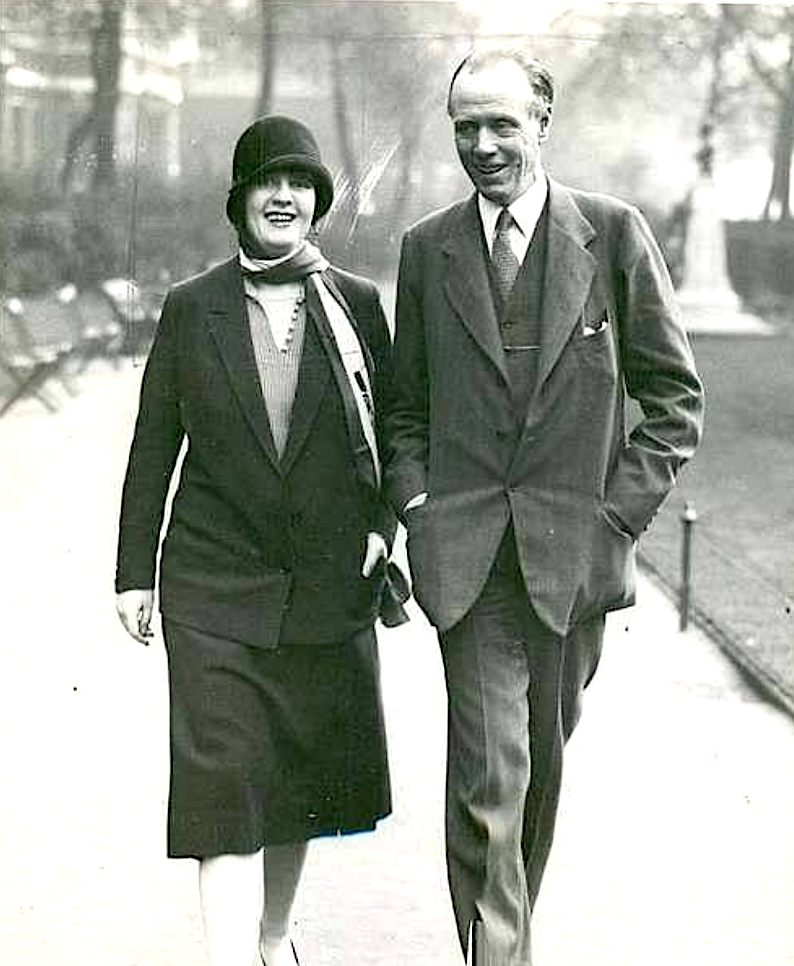
Sinclair Lewis and his wife in 1931. (Wikimedia Commons, Public domain)
Central to Lewis’ thesis was that if dictatorship were to come, it would assume the guise of defending American values and traditions. Wherever totalitarian ideologies pop up, Lewis observed, they always appeal to traditional notions of national pride and patriotism.
“In America the struggle was befogged by the fact that the worst Fascists were they who disowned the word ‘Fascism’ and preached enslavement to Capitalism under the style of Constitutional and Traditional Native American Liberty,” Lewis wrote.
Lewis also understood control of the media was essential. Much of It Can’t Happen Here is devoted to detailing the systematic co-optation of the newspapers and the dumbing down of journalism. Under fictional political leader Buzz Windrip’s rule, the newspapers “print almost no foreign news, except as regards the triumphs of Italy in giving Ethiopia good roads … [b]ut, on the other hand, never had newspapers shown so many comic strips.”
While insightful, Lewis’ visions of how democracy dies was somewhat incomplete. To fully appreciate this process, more attention would have to be given to the subtler systems of control in order to understand the nature of totalitarianism developing in traditional democracies.
The 1949 publication of George Orwell’s 1984 filled this void. Depicting a Western nation under absolute government control, perpetuated and empowered by a permanent war against ever-shifting external enemies, 1984 shows how the government can dominate its subjects through thought control. This is enabled by systematic manipulation of the English language and the shameless rewriting of national history to fit the ruling class’s amorphous agenda.

Orwell in 1940. (BBC, Wikimedia Commons, Public domain)
In Orwell’s dystopia, inconvenient facts were thrown down the “memory hole,” and if anyone questioned the government’s new narrative, they were subjected to torture.
Central to the ability of the government to exercise its power was the elimination of nuanced thinking, which it achieved in part through the introduction of a language called “Newspeak.” In this dialect, subtleties were eliminated, even going so far as to redefine the word “bad” as “ungood.” If something was really bad, it was called “doubleplusungood.”
By controlling the language and by manipulating the historical record, the state was able to prevent free-thinking and keep the people under absolute control.
Anti-Americanism
Although it was written as a warning of what might follow a socialist revolution — based loosely on Orwell’s observations of what he saw happening in the Soviet Union — 1984’s enduring value has been the insight it provides into the authoritarian tendencies of any government.
Many Americans over the years have cited Orwell’s warnings as particularly relevant to developments in the United States, which has used subtle means of control of the media to manage narratives and employed ridicule and repression to go after political dissidents deemed out-of-step or “anti-American.”
Please Donate to the
Spring Fund Drive!
The very concept of anti-Americanism, critics point out, is drawn directly from the lexicon of totalitarianism. As American dissident Noam Chomsky has argued, combating anti-Americanism assumes that the society and its people are identified with state power, rather than the national culture, and when used as a rhetorical weapon against critics of state policy, it serves only to silence debate and marginalize dissent.
The result is not only a deformed democracy, but often, ruined lives and reputations — which serve in turn as a chilling warning to others.
Truman’s Loyalty Oaths
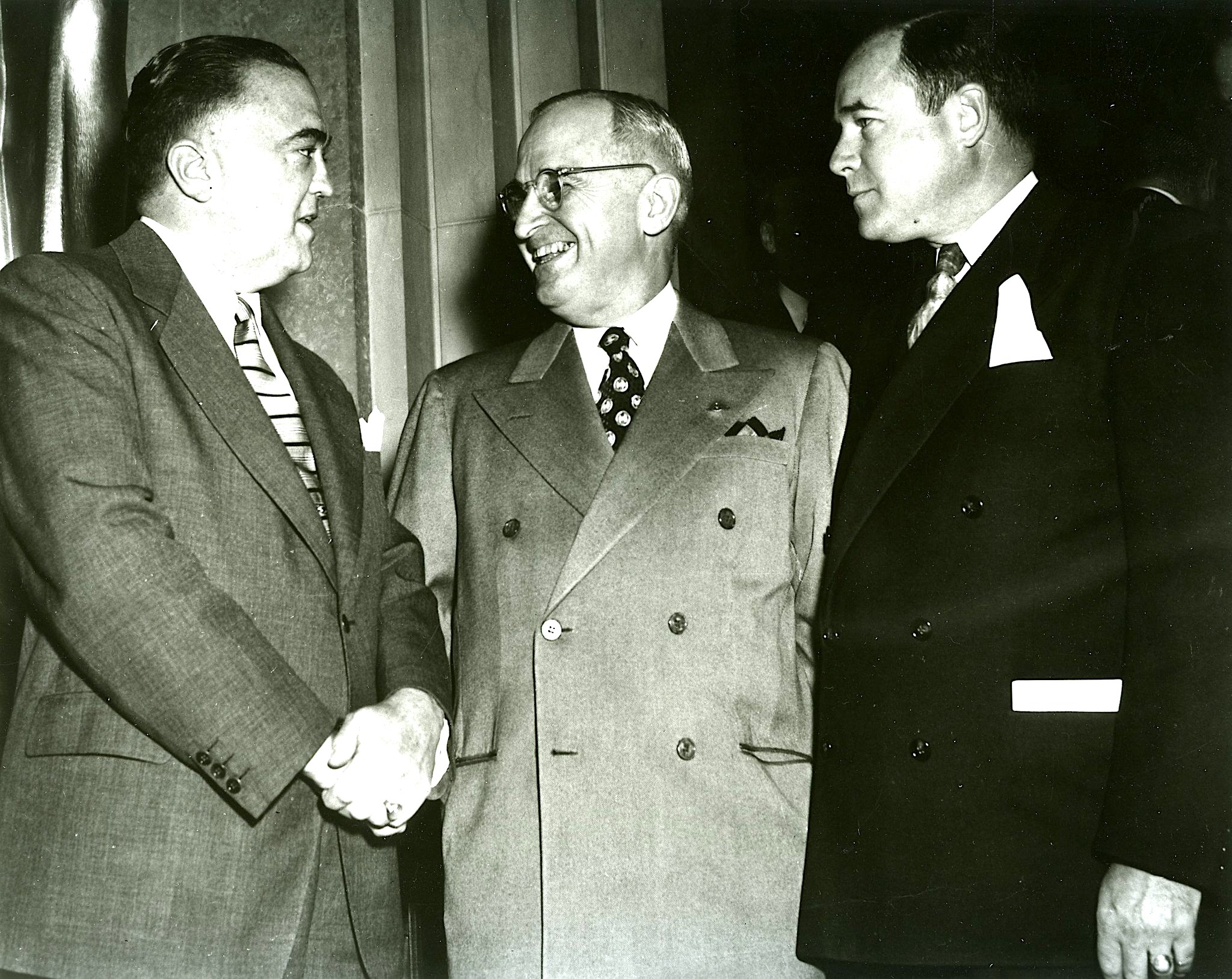
From left: F.B.I. Director J. Edgar Hoover with Truman and Attorney General Howard McGrath before the opening of the National Crime Conference in Washington, D.C., Feb. 15, 1950. (National Law Enforcement Officers Memorial Fund, Flickr, CC BY-NC 2.0)
This was seen when the bipartisan ideology of anti-communism was institutionalized during the Cold War. In 1947, Democratic President Harry S. Truman issued Executive Order 9835, also known as the Loyalty Order, initiating a campaign to stamp out any “infiltration of disloyal persons” in the U.S. government, specifically communists and communist sympathizers.
An internal security campaign was subsequently launched in which 6.6 million Americans would be investigated, with the F.B.I. authorized to investigate federal employees to determine whether enough “derogatory information” about them warranted further review.
Loyalty boards — which lacked procedural safeguards, such as the right to confront critical witnesses — held hearings to determine whether “reasonable doubt” about their loyalty existed, resulting in the dismissal of several hundred individuals.
Several thousand more resigned and thousands more became the target of aggressive investigations and questioning before government or private-industry panels, committees and agencies, most prominently the Senate Internal Security Subcommittee, chaired by Republican Senator Joseph McCarthy.
Although many of the convictions of this period would later be overturned, the message was sent: dissent was tantamount to treason, and would not be tolerated by the state. Countless innocent people suffered loss of employment, ruined careers, and even imprisonment.
Covert Action
Over the next several decades, American democratic principles were further challenged by the excesses of the bipartisan Cold War. Government secrecy and covert action would become the norm, as would disinformation and propaganda, which would have long-term implications both at home and abroad.
The 1953 coup to overthrow the Iranian Prime Minister Muhammed Mossadegh and the 1954 coup that toppled the Guatemalan President Jacobo Arbenz, for example, provided the blueprint for clandestine activities around the world. The coup against Mossadegh eliminated what was considered a promising progressive democracy in the Middle East, and would set in motion decades of political Islam in the region.
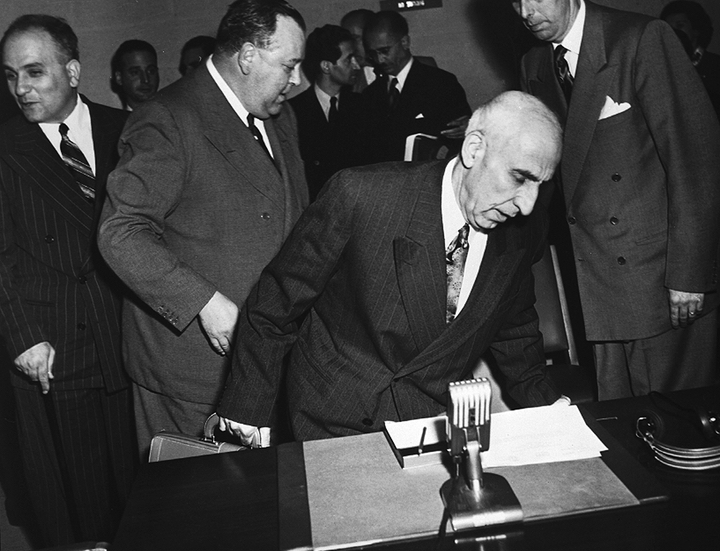
Mossadegh taking his seat at a 1951 meeting of the U.N. Security Council in New York City. (Wikimedia Commons, Public domain)
The Iran coup led to the U.S. installation of the shah’s brutal dictatorship, which was overthrown in 1979 in Iran’s Islamic Revolution, leading to a hostage crisis resulting in the 1980 presidential election possibly being undermined by a treasonous dirty trick known as the “October Surprise.” The ensuing decades of U.S.-Iranian relations have been characterized by mutual animosity, a contentious situation that continues through today.
In Guatemala, the C.I.A. effort to overthrow the president, dubbed Operation PBSUCCESS, resulted in a civil war that killed more than 200,000 Guatemalan civilians from 1954 to 1990. The United Nations later found that in the four regions of Guatemala most affected by the violence, “agents of the state committed acts of genocide against groups of Mayan people.”
Despite the gruesome human toll, the intervention in Guatemala was considered an unqualified success by U.S. government leaders. According to an official C.I.A. study of the intervention, “its triumph confirmed the belief of many in the Eisenhower administration that covert operations offered a safe, inexpensive substitute for armed force” in dealing with leftist governments.

U.S. President Dwight D. Eisenhower meeting with Secretary of State John Foster Dulles at the White House, Aug. 14, 1956. (Wikimedia Commons, Public domain)
Those early coups against Iran and Guatemala set in motion decades of U.S. foreign policy characterized by covert action, assassination plots and overt military intervention.
As former State Department employee William Blum documented in his 1995 book Killing Hope, since the end of World War II, the United States has overthrown more than 50 governments, most of which were democratically elected.
Further, it attempted to suppress populist or nationalist movements in 20 countries and interfered in democratic elections in at least 30 countries. All in all, according to Blum’s count, since 1945 the United States has meddled in at least 69 countries.
A New Era
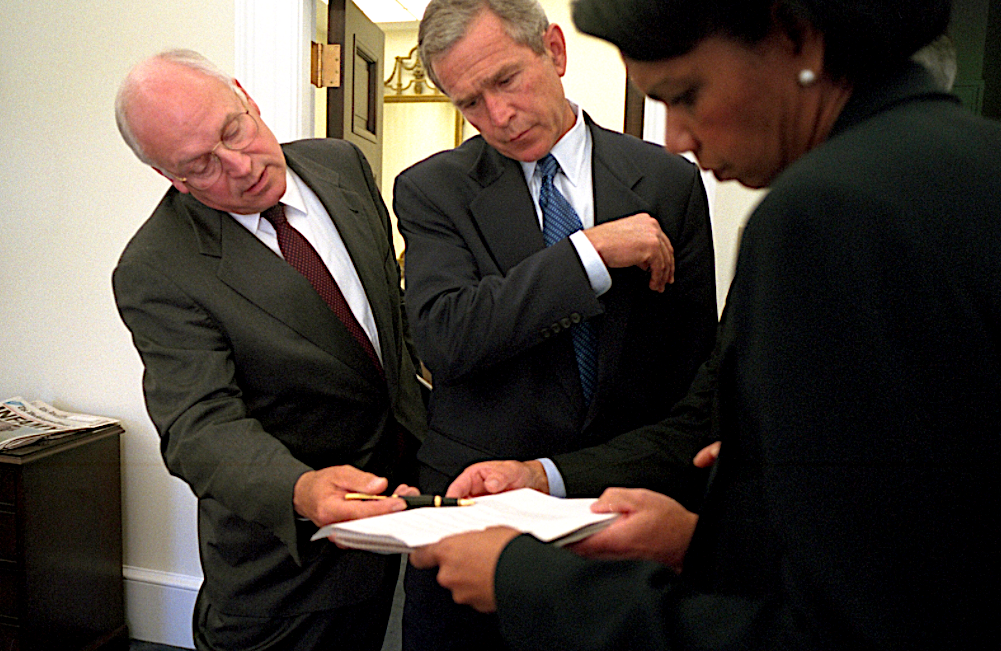
Sept. 12, 2001: President George W. Bush, center, with Vice President Dick Cheney and National Security Advisor Condoleezza Rice looking over a brief together in the White House. (Wikimedia Commons, Public domain)
Following the Cold War’s end in the early 1990s, there were renewed hopes that the dark days of covert action and domestic repression were over. It didn’t take long, however, for those hopes to be dashed.
The government largely continued undermining democracy both at home and abroad, with the United States routinely providing military assistance to over 73 percent of the world’s dictatorships according to one count.
The terrorist attacks of Sept. 11, 2001 — widely seen as blowback for decades of foreign meddling, including the arming and training of the Mujahadeen for their fight against the Soviet Union in Afghanistan ?— ?ushered in a new wave of democratic backsliding, with the Bush administration’s response to the terrorist threat marked by controversial policies such as the Iraq invasion, indefinite detention, the Patriot Act, mass electronic surveillance, and an extraordinary rendition and torture program run by the C.I.A.
George W. Bush — who once joked that “if this were a dictatorship, it would be a heck of a lot easier, so long as I’m the dictator” — seemed intent on ushering in a new style of authoritarian rule. Characterized by novel interpretations of presidential power, including theories promoted by Bush proxies of a “unitary executive” and “presidential power at its absolute apex,” administration policies alarmed liberals and traditional conservatives alike.
Popular Culture References
With anxieties running high during the Bush years, popular culture reflected the concerns of many that the United States was devolving into a new form of dictatorship. The Star Wars prequels, for example, told a story of an interplanetary republic consumed by war, which an opportunistic chancellor cynically used to consolidate power and establish an empire.
In the name of providing security and defending democracy from internal enemies, the elected Chancellor Palpatine worked his way to a position of power, and used his influence to gain more and more authority. With the republic beset by sectarian conflict and secessionist movements, Palpatine took to the floor of the Galactic Senate in Revenge of the Sith and urged the body to grant him permanent emergency powers.
“In order to ensure our security and continuing stability,” Palpatine says, “the Republic will be reorganized into the first Galactic Empire, for a safe and secure society.” The senators applaud the appeal and subsequently grant him his wish.
Astute observers noted the timeliness of the film’s message and emphasized the relevance of its insight into how and why democracies devolve into authoritarian dictatorships.
The film, which came out several months into Bush’s second term, offered a solid analytical framework for understanding this phenomenon, based on a pattern that has been well-established throughout history, from Rome in the first century to Germany in the 20th, and as some Americans worried, the USA in the 21st.
Indeed, George Lucas’ prequel series was seen by many as a parable of what was happening in the United States since 9/11, and a warning of where the country could end up if it continued to trade civil liberties and constitutional rights for security and safety.

Lukas at the 66th Venice Film Festival, June 2009. (Nicolas Genin, Wikimedia Commons, CC BY-SA 2.0)
Agence France Presse even called Revenge of the Sith “a galactic jab to US President George W. Bush” while Washington Post columnist Daniel Froomkin wrote that it was “a cautionary tale for our time.” Froomkin argued that at its core, the movie was “a blistering critique of the war in Iraq, a reminder of how democracies can give up their freedoms too easily, and an admonition about the seduction of good people by absolute power.”
New York Times movie critic A.O. Scott also emphasized the film’s relevance to contemporary American politics, particularly its warning of “how a republic dismantles its own democratic principles.” Revenge of the Sith, Scott wrote, is “about how politics becomes militarized, about how a Manichaean ideology undermines the rational exercise of power,” and should rightly be seen as an indictment of political leaders in the United States.
Scott pointed out one scene in particular that seemed to directly challenge the “with-us-or-against-us” mentality that the Bush administration had adopted in the war on terror. “At one point,” Scott wrote, “Darth Vader, already deep in the thrall of the dark side and echoing the words of George W. Bush, hisses at Obi-Wan, ‘If you’re not with me, you’re my enemy.’” The older and wiser Jedi Obi-Wan Kenobe responds that “Only a Sith thinks in absolutes.”
Challenging the with-us-or-against-us mentality of the war on terror was also a central theme in another Bush-era blockbuster, V for Vendetta. In this film, set in Great Britain in the not-too-distant future, at a time when “the former United States” is embroiled in civil war, a freedom fighter/terrorist (depending on one’s perspective) fights back against a totalitarian state, hoping to spark a revolution by assassinating all of the key government leaders and blowing up the Parliament building.
The defining traits of the regime he sought to topple were its total control over information, its use of mass surveillance technology, its systematic use of terror against its population, and its demand for absolute conformity? — ?with the slogan, “Strength through Unity. Unity through Faith.”
Important for both its warnings of how totalitarianism could take hold in a democracy and its seeming endorsement of violence to effect political change (“Violence can be used for good,” says the protagonist V at one point), the film was perhaps most significant for its box office success at a time of heightened fears of terrorism and expectations for fealty to the government.
Its popularity was seen by some as a rejection of the notion that citizens must obediently support government policies and unquestioningly accept official definitions of terrorism.
Correspondingly, the film was denounced by several conservative leaders. For instance, Ted Baehr, chairman of the Christian Film and Television Commission, called V for Vendetta “a vile, pro-terrorist piece of neo-Marxist, left-wing propaganda filled with radical sexual politics and nasty attacks on religion and Christianity.”
While conservatives attacked the film for being “pro-terrorist” propaganda, other observers pointed out its timeliness and its seeming parallels to modern American society. The Los Angeles Times noted that “with a wealth of new, real-life parallels to draw from in the areas of government surveillance, torture, fear-mongering and media manipulation … you can’t really blame the filmmakers for having a field day referencing current events.”
This included the “black bags” worn by political prisoners of the regime, seen as an allusion to the black bags worn by prisoners at Abu Ghraib and Guantánamo Bay, and the yellow-coded curfew alert system that London lives under in the film, which was seen as a reference to the U.S. government’s color-coded Homeland Security Advisory System.
Director James McTeigue confirmed that he hoped to make the film relevant to contemporary audiences, and had taken some liberties with significant adaptations of the graphic novel upon which the screenplay was based.
“We felt the novel was very prescient to how the political climate is at the moment,” McTeigue said. “It really showed what can happen when society is ruled by government, rather than the government being run as a voice of the people. I don’t think it’s such a big leap to say that things like that can happen when leaders stop listening to the people.”
Americans seemed to identify with this message, sending it to the top of the U.S. box office on its opening day, where it stayed for the remainder of the weekend. Over the next eight months, the film grossed over $70 million in the United States and $62 million abroad.
Its popularity seemed to reflect a worldwide appreciation for the chronic threat of authoritarianism, contradicting the consensus that prevailed in the Western world in the early 1990s following the demise of the Soviet Union regarding the inevitable march of democratic progress.
It also recalls that current-day concerns over the “unprecedented” Trump threat are not really unprecedented at all, and, more importantly, are oblivious to the dynamics of authoritarianism — ?particularly the need to protect against the response to a perceived threat becoming the very thing being defended against.
What is particularly curious about our modern discourse is to hear pundits and politicians deplore Donald Trump as a would-be dictator who considers himself as above the law, when he’s the only president to ever be tried and convicted of a crime, despite others, like George W. Bush, initiating an unprovoked invasion of a sovereign nation.
While several presidents have faced legal troubles, often for far more serious offenses than those that have plagued Trump, none have been convicted in a court of law.
Maybe that’s why the Democrats’ calls for resisting the incoming Trump dictatorship continue to ring hollow among so many Americans.
Nat Parry is the author of the just-published book Samuel Adams and the Vagabond Henry Tufts: Virtue Meets Vice in the Revolutionary Era. He is editor of American Dispatches: A Robert Parry Reader.
The views expressed are solely those of the author and may or may not reflect those of Consortium News.
Please Donate to the
Spring Fund Drive!



The only reason Trump was nominated is that the Bush bros were discredited by lies and lives and the usual caste of characters debating ad nauseam for 2 full years before Trump got on stage to upstage them.
The only reason Trump got elected is likely because of a religious cult-ural empire arranged Supreme Court nomination on hold to go with anti-feminism that cost Hillary as chance and then and barely buried her again. By luck the republicans got a 4 yr run of the same tired old Reagan reactionary agenda.
Then pouring on the anti-Trump destruction project useful for war with the Russian Orthodox world as the one other true church that sprang out of Constantinople , passed thru Kiev and on to Moscow too It is all religious culture war mainly linked to Viking raiding party for a Valhalla on Earth for permanent war profits and pains awakening after each war and then doing it all over again.
“1984 shows how the government can dominate its subjects through thought control.” Nanny Bots are also a big help.
Great historical overview and analysis. To be honest, I couldn’t be bothered to follow the media circus re the DT and HB trials. At this point folks should acknowledge: unlimited political bribery is now legal, money is “free speech” the ever more flagrant institutional corruption of all three branches of govt is in plain view etc.
The very fact that the oligarchy-owned MassMediaCartel is shoving the SAME two senile, genocidal sociopaths in our faces AGAIN should underline that Elections Inc. are a contrived spectacle and have become something of a freak show. The fancy classical Greek term for this is KAKISTOCRACY. There is no democratic accountability, no way to “vote” against the interests of the kakistocratic oligarchy.
Contrary to popular belief, the “liberal” media LOVE the DT, no other political figure has been given so much coverage. Recall the coverage of the DT empty podium while Sen. Sanders was ignored. Recall Les Moonves (CEO, CBS) said that the DT was good for CBS, good for ratings, and profits. The so-called deep state also love the DT: he polarizes, distracts the public – perpetuating the illusion of “choice”. The plebs have to be kept tilting at windmills, distracted, misinformed and focused on emotional and cultural issues.
Participating and legitimizing a sham only perpetuates the status-quo. In an ideal world, we would all organize and protest in front of the polling places with a list of demands. (I know that won’t happen, too many are caught up in the media circus freak show. When they say “jump” you say…)
It might be a worthwhile article, but I won’t know because I stopped reading after
“With President Joe Biden’s poll numbers tanking,”
Not good to begin your piece with such a dubious and arguable claim.
It’s fairly well-established empirical fact actually: hxxps://projects.fivethirtyeight.com/biden-approval-rating/
Apparently the standard “godless heathen” (self-avowed) socialist AOC is unfamiliar with the basic tenet of (the essentially totalitarian institution) religion: “strive to imprison only others from whom you would accept attempts to imprison you.”
I’m no fan of former president Trump, nor is Nat Parry, the author of this article, but genocide, the brink of nuclear war, inflation, recession, the political weaponization of the legal system and the judiciary, the criminalization of protest, censorship of social media and independent journalism, abuse of the legal system to keep opponents off the ballot, those are clear and present realities, not just dangers? Now that’s cause for anxiety. The big problem with the article is that it erroneously equates the Democratic Party and the Deep State with liberalism and that it totally ignores the Clinton-Obama-Biden axis of evil citing primarily examples of much less restrictive GOP abuses. But the theme is relevant. Trump is far from the greatest threat to Democracy in the upcoming election. Ask Jill Stein, Cornell West, PhD or Robert F. Kennedy, Jr.
“While it is debatable whether Trump and his MAGA supporters were ever truly the existential threats to democracy that his detractors claim”, is the other problem with this article. What is it he’s afraid to say? You only have to look back at his 4 year presidency to know the answer. Beside the freak show and burlesque theater displayed in that time, Trumps reign in office is unremarkable at best and almost indistinguishable from any other republican presidency, let only these last 4 years of almost nothing legislatively.
Of course I agree wholeheartedly with you assessment
Unless there is some kind of actual revolution, the US is quite possibly headed for some kind of actual dictatorship at some point. But it’s not going to be Trump. He’s shown no inclination towards that (or frankly competency), and he simply doesn’t have the kind of military backing required for such a thing. There are, however, some disturbing parallels in the abuse of the legal system that we’ve observed the last few years to what happened in the late Roman Republic.
When the traditional stratification of the legal system is breached, and the judiciary begins to be used by politicians to go after their political rivals, it is easy to slide down a slippery slope until anything goes in the political arena. I say traditional stratification, because there’s never been a president in US history who was served justice for the high crimes they committed while in office. The unspoken rule of our rulers has been that once you reach a certain level of political power you essentially become untouchable–to go after one of you means that any sort of even-handed judicial system would then have to go after all the rest, and our rulers as a class certainly don’t want that. In Obama’s words, a new leader must “look forwards, not backwards”.
What happens when this rule is broken? In Rome the facade of an impartial legal system unraveled very quickly. An elected tribune proposed a controversial bill for land redistribution, deposed one of his rivals with veto power in a way the legal system had never been used before, and then when it looked like the bill would pass unopposed, a senator from the opposing fact simply said, “anyone who wants the community secure, follow me”, gathered a mob together and murdered the tribune in broad daylight under the pretext of defending the state from an existential threat. What followed after was a series of violent reprisals from one political faction to the other until eventually the military began to take sides in these disputes. That was when they escalated to nearly a century of civil wars that finally concluded with a naked imperial dictatorship.
It’s very hard to restore a sense of trust and dependence on a legal system once its credibility has been destroyed. I fear the only options are a complete overhaul initiated by the citizenry, or an open invitation from some strongman to finally ignore all rules and seize power.
You’re damned if you do [point out the Trumpian phenotype is no different], and damned if you don’t [cause you’re more or less inviting some Buzz Windrip to take over, along with an intensification of phenomena discussed by Bandy X. Lee, MD].
The blue power trippers today yes are like the red ones of prior times (and also most of’em today worse than the worst of the blue ones prior). Still, if you say they’re totally alike, as in the Trump/Biden case, it’s sowing confusion. OTOH, if you say nothing about the matter at all, then you have not relayed forward one important perspective…at least getting it out there for consideration. Putin’s opinion [whether or not Trump and Biden are both capable of selling out peaceniks, which they are] that Trump is more likely at any given juncture to come out of left field with drama conceiving in his own mind whatever big bad stratagem is a stroke of his own genius. Putin’s statement was more controlled. He simply said Trump was more unpredictable. It might be such a tiny smigen more, though, that saying it that way was Putin’s idea of black humor?
IMO Trump should be pressured not to do payback on Biden, and the Israeli powers that be should be pressured not to deliver vengeance on top of Netanyahu. Let these two relax so they can back out of the crapola they’re perpetrating…back out without fear.
People should READ the Presidential Powers section of the Constitution.
A president has no power to arrest people or put them in “camps”.
This sort of thing is pure fearmongering for political purposes
All the power to spend money and to pass laws rests in the hands of Congress
That’s right. It makes my blood boil to see these politicians and media hacks lying and fear- mongering over Trump.
Rights, powers, constitutions, etc. are only effective as long as there are members of the ruling class willing to enforce them. What should alarm people is the evisceration of the legal system during the recent clown trials to go after a former president over something as petty as hush money to a porn star. The legal system has never been used in quite this capacity to persecute political rivals, and a dangerous precedent has now been set. When the legal system destroys its own credibility, you lose one of the institutions meant to keep the executive and legislative in check. It’s not Trump or our current cadre of gerontocrats that we have to worry about, it’s the next generation of politicians that will have learned from this history and concluded that ignoring the rules is the new normal.
Not really true.
Congress over the past century has delegated much of their legislative power to executive branch administrative agencies, who make their own administrative law and enforce it while Congress twiddles it’s thumbs. Who do those agencies work for? The guy at the top of the executive branch, POTUS. President’s defy congress and the courts all the time. Obama did it with DACA, Trump did it with travel bans and, Biden is doing it right now with student loan forgiveness, and EVERY politician in America from local mayors up to Trump and Biden did it during Covid. Sure, they eventually have to stop, but they would rather do what they want and ask forgiveness than wait for permission.
Even Congresses war making powers have been delegated to the executive branch through the Authorization of Use of Military Force post-9/11. Congress hasn’t declared war since WWII. Every war since then has been authorized by the executive branch.
The Constitution? The Rule of Law? How quaint.
If Dems want me to vote for them, why don’t they offer something positive? Like National Health Insurance? Like Germnany has had since the 1880s? Why not stop constant wars? Instead of a new proxy war with Russia and attempting to start a proxy war with China?
Why haven’t Dems shut down the Guantanamo Bay Prison? Does Obama’s Kill List still exist? O. didn’t hesitate to kill US citizens with it.
Wow, what a convoluted history – perhaps we should realize that neither of these two old men are what this country or this world needs right now or ever for that matter. One is old and dithering, the other is old and vindictive. Yep, we are in for Mr. Toads Wild Ride regardless of who is in office come January 2025 – if we make it until then…
They’re both crooks, but Biden’s crookedness makes Trump’s look like child play, and he gets away with it. Biden, up to his neck in dirty Ukrainian loot, is “leading” us to utter catastrophe but the media turn a collective blind eye.
The Biden family knows how to color within the lines of traditional Washington greed, graft and crookedness.
The Trump family doesn’t even realize there are lines.
That’s why the Biden family gets away with it and Trump gets 93 charges,potential jail time, and a half-billion dollars in damages (so far). Decide for yourself which is worse. The amateur crook who gets caught and punished, or the professional crook who doesn’t.
How do you suppose Sinclair Lewis wrote ‘It Can’t Happen Here’ without being married to Dorothy Thompson? That’s Dorothy, in the photo with Sinclair. By 1925, she was head of the Berlin bureau for the New York Post. She married author Sinclair Lewis in 1928. She exposed and criticized the Nazis early on, and, in 1930, was one of the first journalists to interview Adolph Hitler. She predicted the Germans would start a new war by the end of that decade. In 1934, her aggressive anti-Nazi reporting caused Hitler to expel her from Germany.
“In the words of the American foreign correspondent Dorothy Thompson: ‘It is not the fact of liberty but the way in which liberty is exercised that ultimately determines whether liberty itself survives.’”
There’s a supreme irony in Obama quoting Thompson, whose truly stellar career ended in charges of antisemitism from Zionists, to a crowd of journalists who quake in fear of having their careers destroyed by Israel supporters who more recently smeared Helen Thomas, Rick Sanchez, Octavia Nasr, and Jim Clancy for off-hand, ill-conceived remarks. + Claudine Gay and many, many others to this sad list.
hxxps://mondoweiss.net/2015/04/journalists-thompson-silenced/
Thanks for these words of sanity and perspective. It seemed to me all along that we are witnessing a vicious dogfight between rival elements of the same ruling oligarpchy. Neither is on our side. The alarmist hyperbole from both factions is quite phenomenal.
It all so resembles the fall of the Roman Republic, which also came about due to military overstretch and the insatiable greed of the aristocracy. When the first emperor assumed all the formerly separate powers of the state to himself, the people were so grateful for the return of stability that they happily accepted his usurpatuon, and the day was ever after celebrated as what he termed “Resoration of the Republic” day.
“The political and media establishments in the U.S. — which have jointly wrought so much destruction, decay, and decadence — recently decided to unite against Donald Trump. Their central claim is that the real estate mogul and longtime NBC reality TV star advocates morally reprehensible positions that are far outside the bounds of decency; relatedly, they argue, he is so personally repellent that his empowerment would degrade both the country and the presidency.
[…]
But in many cases, probably most, the flamboyant denunciations of Trump by establishment figures make no sense except as self-aggrandizing pretense, because those condemning him have long tolerated if not outright advocated very similar ideas, albeit with less rhetorical candor. Trump is self-evidently a toxic authoritarian demagogue advocating morally monstrous positions, but in most cases where elite outrage is being vented, he is merely a natural extension of the mainstream rhetorical and policy framework that has been laid, not some radical departure from it. He’s their id. What establishment mavens most resent is not what Trump is, does, or says, but what he reflects: the unmistakable, undeniable signs of late-stage imperial collapse, along with the resentments and hatreds they have long deliberately and self-servingly stoked but which are now raging out of their control.”
Source:
Glenn Greenwald, “Donald Trump’s Policies Are Not Anathema to U.S. Mainstream, but an Uncomfortable Reflection of It,” The Intercept, March 4, 2016
—
“Trump described his foreign policy as ‘America First,’ thus tapping into a more-than-century-long strain of American isolationism, or conservative anti-war sentiment. But his attacks on American empire were not ideologically coherent. He hated NATO but he loved Israel. He increased pressure in Cuba, but did the opposite with North Korea. He increased the military budget even as he attempted to withdraw troops all over the planet. His reasoning, when given, was crassly transactional.
[…]
But look abroad. Trump threatened the entire system of US global hegemony. He threatened it for different reasons and in different ways than might grassroots, socialist, anti-imperialists, but he threatened US empire nonetheless.”
Source:
Christian Parenti, “Trump Against Empire: Is That Why They Hate Him?,” The Grayzone, February 15, 2023
The bottom line is that certain segments of our elite are fearful of the nominal nationalism Trump represents.
Trump is now more or less every bit the warpig as any run of the mill Russophobic Dem or neocon Republican — he was instrumental in getting the $65 billion in aid passed and he’s repeatedly stated that the Zionist state should “finish the job”, which implies total annihilation of the Palestinians in Gaza.
So we seem to have come to a bit of a contradiction in that Trump represents what our ruling class desires by way of the Washington-Zionist-militarist empire. However, as stated, it’s the nationalist populist rhetoric he espouses at times that horrifies a segment of our ruling class who prefer a tossed salad nation versus a more homogeneous country bc they feel an uprising of the unwashed masses is less likely with the tossed salad.
The Big Bad Trumpenstein is the best thing ever to happen to the Democratic Party. The fundraising off paranoid Dem partisans has got to be absolutely through the roof.
It was downright hilarious recently listening to Maddow and the TV show “The View” talk about Trump shutting them down and putting them in camps! Oh, the belly laughs! Imagine thinking you’re that important or that much of a threat, or actually differ all that much from the core agenda of Trump, since Trump now has become pretty Russophobic and helped Johnson get the recent $65 billion in aid to Ukraine passed.
Electoral politics are an absolute joke. Real change is only going to happen outside the ballot box. Washington’s a cesspool of CIA Dems, neocons, warmongers and gonadal identity politics obsessives, that’s it. Nowhere is there room for a genuine anti-war platform, a Med4All movement, and other populists things.
Great article! I’d love an article on Big Religion’s powerful role in it all. They have their claws on everything and still they hide in the shadows.
What is there to know?
Democrats have a stranglehold on black churches (regardless of denomination).
Trump has a stranglehold on white Evangelical Christians.
Catholics and mainline Protestants are pretty evenly split, with both groups leaning Democrat.
Democrats get about 2/3rds to 3/4ths of the Jewish vote, and about 4/5ths of the Muslim vote.
hxxps://religioninpublic.blog/2021/03/29/the-2020-vote-for-president-by-religious-groups-christians/
How refreshing to put into words what many have witnessed since 1980.
Agreed! Except, I’d have said 1970. I wasn’t in my teens, but I was old enough to hear when the news of Kent State went across the nation … four dead in Ohio.
I know I’m a freak, but I now view the 1960’s as the last, best chance for America. A generation rebelled against the American post-war culture that was building a world empire. Tried to reform America. As Dr. King said, change an America that had found itself on the wrong side of world revolution by having a revolution of values. America responded with bullets. The popular politicians who tried to lead change, ended up dead. And others besides. Violence, Death and Prisons were the American reaction to a generation that said America was headed in the wrong direction.
Ronald Reagan started as the tough-on-crime politician who was cracking down on hippies, and by 1980, he was in the White House. America had rejected the calls for peaceful revolution, and done so with violence. The CIA director was now Vice President, and on track to become President. JFK was the last truly popular President, with a average approval rating of over 70%. We are not supposed to notice that nowadays, in our great democracy, all our leaders are deeply unpopular.
JFK was the last truly popular president?
Weird.
I figured the guy who won 49 states and nearly 60% of the popular vote in 1984 must have been pretty popular.
Love Reagan or hate him, the votes don’t lie.
I was in the USN from 70-74. The 60’s rebellion started as the Civil Rights Movement, and later morphed into the anti war movement. Haig, Cheney, et. al. were in Nixon’s circle, up to and including Bush II. We threw a monkey wrench into the works, and sometimes it seems the establishment is ‘getting even’ with us.
Could it be that what makes it ring hollow is …
1) highly censored American “mainstream” media
2) the world’s largest prison population
3) a recently renewed government approval for mass surveillance of American citizens
4) police forces that are highly militarized and staffed with “vets” who report killing over 1000 Americans a year.
5) Constant campaigns to ban or deplatform and generally cancel any voices who disagree with the Democrats. The modern version of book burnings.
6) Scenes of students being attacked across the nation, largely by Democrat mayors, for the crime of trying to protest non-violently against an ongoing genocide.
7) A Democratic Party that is now so anti-Democratic that a President with an approval rating below 40% and about whom 50% of Democrats have told pollsters that they don’t want as the nominee … is cruising to victory with vote totals that I’m tempted to compare to General Sisi of Egypt.
8) Democratic budgets that want to give all the money to the military, the police, the spies and the prisons.
None of that says Democracy and Freedom …. thus, it rings hollow that we must hate someone else because they might be the enemy of Democracy and Freedom. If you want to campaign on defending democracy, its best to actually provide something like a functional democracy so the people have something to defend. And its definitely best if people don’t break into open laughter when you call this as “freedom”.
I very much agree with Abbie. There are all kinds of violations of democratic practice and expression going on now. I think of university presidents at august institutions like Columbia and U.C.L.A. calling out police who beat up and arrested many nonviolent demonstrators against Israel’s massacres of Palestinians. This is a blatant violation of free speech and expression. There is also a great deal of scare mongering about Trump, who is supported mainly by political and religious conservatives. Trump already served a term as president before Biden, and there was nothing out of the ordinary, so far as authoritarianism is concerned, in his administration. On the other hand the Democrats have used a great deal of inappropriate overkill and fear mongering to get him out of office. This includes two impeachments, which came to nothing because there was nothing there. And his conviction for buying the silence of a porn actress about her previous relationship with him was politically motivated and many believe not criminal. He was also tried in a very Democratic New York City. The Democrats want to cast aspersions on him and preferably not run against him because he is popular among many in the electorate. And now in the 2024 campaign, they are putting out all kinds of warnings of some kind of a Trump dictatorship, should he get back in office. Some of Trump’s off the cuff, overheated rhetoric contributes to this. But Trump is hardly the only presidential candidate to use overheated rhetoric. It is a common American practice. If one wants to criticize Trump within the American democratic tradition, one needs to do so by looking at his policies rather than raising the specter of authoritarianism or worse, totalitarianism. I say these things not as a supporter of Trump, but as a supporter of traditional electoral campaign politics, which some of the anti-Trump forces have been violating.
I’m not sure I would classify breaking up occupations as a violation of free speech.
Americans have a right to march and protest, but they don’t have a right to commandeer public spaces and deny them to others. Nor do they have the right to occupy property at a private institution. Squatting in a campus quad, or in a public park or highway infringes on the rights of others to use those areas. There are plenty of apolitical college students who would like to use the quad throw a frisbee or catch some sun. And plenty of apolitical boomers who just want to get home from work after a long day and not deal with a highway being blocked by protestors. They have rights too.
Stephen Berk, excellent comment!
Steve: Regarding the rights of students to their protest encampments on the campuses, these protests follow decades of discrimination within these institutions against both Palestinians and those who advocate for them.
Which public spaces were commandeered so that others could not use them? A person walking on a sidewalk has “commandeered” the space he or she takes up so that others cannot use the same space. However, I am not aware of the Palestinian protesters’ blocking students’ access to their campuses. Demonstrating is not “squatting” —this is a misuse of this term.
In the case of public institutions such as UCLA I don’t think these properties can be characterized as private property. Quite apart from the fact that students at these institutions are in a sense citizens of the institution.
In the case of, say, Harvard, a private institution, the charge of exploding antisemitism at Harvard is ridiculous. Virtually every president of Harvard since Derek Bok has been a Jew. I am a graduate and know very well the influence of Jews in the administration and particularly the power of the Jewish donor base and its footprint at Harvard. This came to blinding light with the tantrum of Bill Ackman, but was already obvious to those who were looking, when Larry Summers blocked the invitation of a Palestinian poet by the English Department, at the behest of his Jewish girlfriend. Harvard became increasingly authoritarian and woke under Drew Faust (married to a Jew and possibly Jewish herself). If there was any antisemitism going on at Harvard it was under the auspices of these Jewish presidents and donors.
Just as I have become disgusted with the hypocrisy of the Dem. Party I have become equally disgusted with Harvard. Each successive administration has become more money-grubbing and ideologically slanted than the previous one (and this includes the B-School and the Kennedy Institute).
It was high time that Harvard et al. got a shake-up regarding their tilt towards Zionism and against Palestinian rights and that the public got some peeks into how these joints (also, say, Columbia, with its professor’s ties to the IDF)—supported either directly by the public via taxes or indirectly in that they ave tax-exempt status—are now being run, that is, who is actually running them. At Harvard members of the Corporation—most of them CEOs of one sort or another in the financial world— contravened the decision of the Faculty of Arts and Sciences and acted vengefully against Harvard’s own students who criticize Zionism and protest the racist genocide in Palestine. Yet most of the Corporation members appear to me to have major conflicts of interest when it comes to their positions and their adjacency to Jewish money interests.**
In light of this big picture, to me carping about the encampments to end genocide amounts to pipi de chat.
**It is not that easy to find out exactly who the corporation members are. In December 2023 WBUR reported: “At its helm is Penny Pritzker, a billionaire businesswoman and former U.S. Secretary of Commerce in the Obama administration [[this alone is an insult to the intelligence]]. She led the Harvard presidential search committee that selected Gay as president. Other long-serving members include Paul J. Finnegan, co-head of a Chicago investment firm and past president of the Harvard Alumni Association and Ted V. Wells Jr., partner and co-chair of the white-shoe law firm Paul, Weiss, Rifkind, Wharton & Garrison. Past members include David Rubenstein, co-founder of private equity firm The Carlyle Group.”
Please refer to Project 2025 waiting for Trump’s inauguration. I think the extent of this neofascist program is unprecedented in our politics & feasible given today’s climate.
One fascinating fact about Jan 6, 2021, in the category of Dogs that Did Not Bark.
Nobody in the Democratic Party called on “the people” to come out and defend the democracy. I know American’s don’t know history, but this is a standard action. When a democracy is under attack, when any government regarded as a people’s government is under attack, it is standard for the leaders of that system to call on the people to come and defend their government. We have in this century seen this with a different “people’s government”, as Chavez of Venezuela responded to the Bush/Cheney coup attempt by calling on the people to defend their government. And they did. When a democracy is under attack, it is normal and natural for that government to call upon the people to defend the government of the people.
I know the Trumpers like to think they are tough, but I used to visit parts of DC that Democratic politicians don’t see and want to “urban renew”. If the people of DC had reacted to the Trumpers’ action on Jan 6th, the Trumpers would have found themselves very outgunned in DC. A few thousand rednecks with guns ain’t nothing compared to what some of the residents of DC have in their closets. If the people of DC had come out in mass to defend their government, then you’d have seen pickup trucks with MAGA flags getting speeding tickets to get out of town fast from the automatic weapon fire.
What does the dog that did not bark tell us? Well, first, that nobody in the Democratic establishment thinks of this as a people’s government. Even when pinned down from a mob, and fleeing for their lives, not a single one of them thought to call on the people to come out and rescue them. They called their true allies, the police and the military, and later complained about how slow they were. But calling the people never entered their minds, not even when they were in widespread panic.
And secondly, that the people of DC had no interest in coming out to defend the Democrats, or a government where they’d rather defund the police than fight themselves to defend the government. They didn’t come out on their own, and the Democrats, if they had even considered making a call to the people, should have realized that none of those people had any reason to save Democrats.
They didn’t call for help because they didn’t need it. January 6th was a few hundred yahoos who turned a peaceful protest into a violent riot, and maybe another 1000 or so looky-loos who took an unauthorized tour of the Capitol grounds and got hit with a ‘parading’ charge and not much else. Pretending that they represent all 70+ million people who voted for Trump is repulsive, as is pretending a few hundred BLM rioters in the summer of 2020 represented all 80+ million Biden voters.
Project 2025 is basically warmed-over Reaganism, taking a machete to the executive branch agencies, putting them through a couple rounds of decimation, and filling as many of the remaining jobs as possible with partisan conservatives rather than the partisan liberals. And honestly, a little more ideological balance in the federal bureaucracy might be a good thing. There are a whole lot of ideological echo chambers in the administrative state where no conservatives are allowed (unless they remain incognito).
hxxps://www.fedsmith.com/2021/02/12/political-donations-and-federal-employees/
Thank you for this article . . . I think Trump was/is a threat to the Deep State the Military Industrial Complex (add Mass Media too)